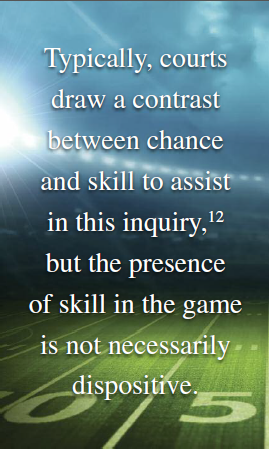The Alabama Legislature Takes Its Chance on Daily Fantasy Sports
| Publication year | 2019 |
| Pages | 0457 |
| Citation | Vol. 80 No. 6 Pg. 0457 |

On May 31, 2019, Governor Kay Ivey signed into law H.B. 361, a bill legalizing Daily Fantasy Sports ("DFS") in Alabama.1 Two highly popular DFS operators had previously suspended all operations in Alabama after then-Attorney General Luther Strange issued a press release claiming that DFS were illegal under Alabama law.2 However, H.B. 361 legalizes DFS-for now, at least.
In traditional fantasy sports, participants select a lineup of real-life professional athletes to create a fantasy team whose performance is measured throughout the real-life season of a sports league through statistical analyses of the fantasy team compiled by each participant.3 The fantasy teams of the participant(s) who accrue the most fantasy points win the game.4 DFS features a variation of this system in that each participant selects his or her fantasy team every day, and the winner(s) of the contests are similarly determined each day.5 Additionally, while traditional fantasy sports participants are largely comprised of self-selected groups of friends or colleagues, DFS are played online with up to thousands of participants per contest.6
Alabama's Constitution prohibits lotteries. Specifically, § 65 of the Alabama Constitution prohibits "lotteries or gift enterprises" and commands the legislature to "pass laws to prohibit the sale in this state of lottery or gift enterprise tickets, or tickets in any scheme in the nature of a lottery."7 The supreme court highlighted the immense strength of the public policy against lotteries in 1888 when it declared:
No state has more steadfastly emphasized its disapprobation of all these gambling devices of money-making by resort to schemes of chance than Alabama... [T]he voice of the legislature has been loud and earnest in its condemnation of these immoral practices, now deemed so enervating to the public morals.8
CHANCE VS. SKILL IS BORN AND RAISED
After previously taking a case-by-case approach on the question of when a scheme constituted a "lottery" using a broad and ambiguous definition thereof,9 the supreme court announced in 1938 a new definition of a "lottery" in the following terms: "(1) A prize, (2) awarded by chance, (3) for consideration."10 The key element of this definition is whether the prize is "awarded by chance."11 Typically, courts draw a contrast between chance and skill to assist in this inquiry,12 but the presence of skill in the game is not necessarily dispositive. The supreme court announced in the 1948 Minges v. City of Birmingham case that a game need not be purely of chance to fall within this definition of a lottery.13 In other words, a game can be a game of chance-fulfilling the second element of the definition of a lottery-even when skill is involved. This rule, followed in Alabama and a majority of jurisdictions, is known as the American Rule, which stands in contrast to the English Rule, which holds that if skill plays any part in the game, then it is not a game of chance, and thus not a lottery.14
Attempting to provide more guidance on the second prong of the Grimes definition of a lottery-when a game is a game of chance-the court in Minges looked to American jurisprudence and held that a game is a game of chance "if chance is the dominant or controlling factor."15 "However," the court continued, "the rule that chance must be the dominant factor is to be taken in the qualitative or causative sense, rather than the quantitative sense.16
While Minges provided clarity by establishing that Alabama adhered to the American Rule, Minges also inserted a new, muddier analysis: whether chance is the dominant factor "in the qualitative or causative sense."17 Applying this standard proved predictably difficult, as Alabama courts would struggle to decipher when games were games of chance or games of skill, as discussed below.

THE ADDITION OF THE FREQUENT PRACTICE RULE
Three years after the Minges decision, the court of appeals took a different approach in White v. State. In this case, the court considered whether a pinball machine operated by participants using flippers was a game of chance.18 After extensively quoting Alabama cases and a Florida case on which the courts relied on the moral dangers of lotteries in the relevant legislative scheme in the chance-vs.-skill debate, the court of appeals appeared to introduce a new factor in the analysis: the amount of practice needed for the general public to acquire the skill needed to deem the game a game of skill. The court held:
Even so, the trend of the testimony of appellants['] own witnesses was that long practice on the machine was necessary to acquire the skill essential to overcome chance.
We do not think that the great mass of the patronizing public has either the time, or inclination, to develop whatever latent talent they may have in this field of endeavor. It would appear therefore that as to the public in general[,] this machine, despite the addition of the flippers, is still a game of chance.19
Four years later, the court of appeals reinforced this rule and restated it in slightly different terms. In Club 400 v. State, the supreme court considered whether a baseball-themed pinball machine in which players hit the ball into relevant areas of the playing surface which corresponded to certain achievements (i.e., hitting the ball into certain pockets resulted in a single, home run, out, etc.) was a game of chance.20 Citing the White decision, the court held that this game was a game of chance despite the skill needed to operate the machine because "[t]he evidence showed that for a player to acquire skill in the operation of the game requires frequent practice..."21
THE JUSTICES ADVISE THAT SETTING ON DOG RACING IS NOT A LOTTERY
The next significant decision in the skill-vs.-chance debate came in 1971, when the supreme court offered a new guidepost on this issue. In a 1971 Opinion of the Justices, the legislature requested the opinion of the justices of the supreme court regarding whether two bills that authorized pari-mutuel betting on dog racing would violate § 65 of the Constitution.22 Parimutuel betting is simply a form of betting in which participants who bet on the winning contestant share the total stakes while paying a small fee for the management of the betting system.23 In determining whether betting on dog racing through such a system was a game of chance, a five-member...
To continue reading
Request your trial
